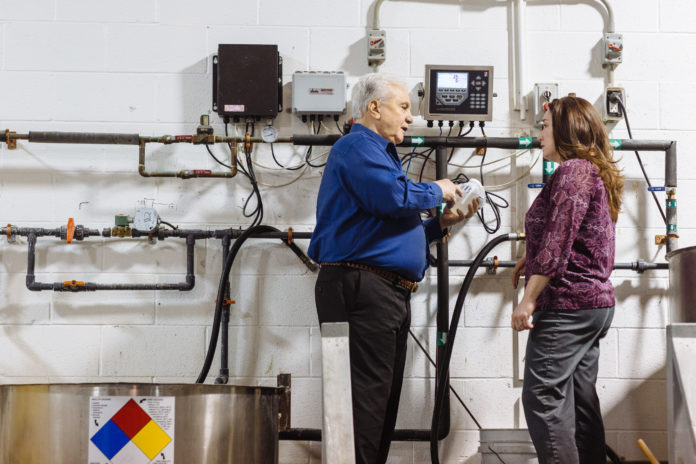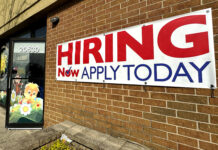The sun is once again beginning to shine on the Rhode Island economy.
Results paint 2016 as a good year for Ocean State businesses, and projections for 2017 are positive, according to the Winter 2017 PBN Business Survey, with predicted growth and increased hiring expectations reported by most companies.
More than three-quarters of respondents to the survey said that net income in 2016 surpassed that of 2015. And roughly the same percentage expect their own business and the Rhode Island economy to be better in the coming year than in the past one. But all is not rosy, as local business leaders cite significant obstacles to self-sustaining economic growth, including taxes, government fees and bureaucracy, health care costs and a shortage of qualified workers.
Results from the winter 2017 survey marked the 18th edition of Providence Business News’ biannual measuring of the business community’s pulse. Seventy-seven of the 571 companies contacted responded, and they represent a cross section of eight industries. Questions were sent by PBN in January and responses received by the end of that month, reflecting post-election perspectives.
Despite respondents’ generally positive feelings, economists and educators say, as they have in the past, that the smallest state in the union’s economy will ebb and flow in unison with national markets. And the particularly contested election and subsequent functioning of President Donald Trump’s administration may have a larger effect on Rhode Island than many previous administrations, although that impact so far has not produced any headwinds for the Ocean State. In the 16 weeks since the election, the Dow Jones Industrial Average has gained 15.4 percent, and the combination of their own experience and national expectations would seem to have Rhode Island companies feeling bullish.
Edward M. Mazze, distinguished university professor of business administration at the University of Rhode Island, who worked with PBN to develop the survey, said the new national political leadership is likely to bring change.
Republican administrations “tend to be pro-business,” he said, and concerns that had been building during former President Barack Obama’s tenure over the growing number of bank, energy and health care regulations will now have a receptive audience in Washington.
He believes if Trump follows through with campaign promises to decrease business regulations, the Ocean State economy will receive a boost.
Christopher D. Graham, Providence office managing partner of law firm Locke Lord, said companies were split on how to react to the election.
He recalled a “typical flurry” of fourth-quarter activity as deals were concluded before the new year, while others “took their foot off the peddle” to see how the new president’s policies would affect them.
Business owners’ reaction to the election of Trump, as told to Graham, included an expectation for tax cuts and infrastructure projects aplenty. Graham said November, immediately following the election, was characterized as a “deep breath and assessment,” but that has now turned into “a general optimism undergirded by social tension.”
With the current foreign policy attitude of the Trump administration, Mazze said the large firms that make up Rhode Island’s military defense industry will benefit, in turn creating a positive revenue stream bolstering the state’s smaller companies – those that supply materials and resources to larger defense contractors.
Mazze has a positive outlook on local public policy as well. The well-known disconnect between Rhode Island business owners and state government, in which “businesspeople speak, government talks – but there’s no action,” may be coming to an end.
There is a lag time between implementation and measurable impact. Mazze said he was impressed by Gov. Gina M. Raimondo’s efforts to establish groundwork for multiple programs and incentives to help boost the state’s economy, but characterized his outlook for their ability to produce jobs and benefit businesses as “guarded optimism.”
Deep in the black
One reason for the improved local outlook is businesses’ increased net income year-over-year. Surveyed since the beginning of the year, 78.1 percent of respondents said their net income was better in the most recent 12 months when compared with the previous year. A year ago that portion was 67.6 percent.
There is a “guarded optimism” among CEOs who are looking to shed the negative, lasting impacts of the Great Recession, said Mazze, with businesses now “paying much more attention to their bottom line.”
“Rhode Island was probably the first into the recession. … As you drive around, you still see empty storefronts and buildings that have been empty for years,” images that haunt business owners, he said.
The 10.5 percentage-point increase in the portion of companies reporting a year-over-year increase in net income in winter 2017 also can be explained by the persistently low interest rates, said Mazze, which allowed for more borrowing and an uptick in spending.
At the same time, as the unemployment rate has decreased and personal income increased, consumers are meeting business owners’ positivity with a similarly bright outlook, he explained.
“You can see things are bubbling again,” said James J. Malachowski, chairman and managing partner of the Providence-based marketing firm RDW Group.
Malachowski, who did not provide statistics on RDW’s net income, said the company’s gross income increased by $1 million in 2016 and he expects even better results in 2017.
The 80-person firm also grew its customer base and staff since last winter as a result of the positive outlook felt statewide.
“From a marketing perspective, I think companies are looking to spend again. CEOs are tired of the bunker mentality,” he said.
Still, not all respondents are feeling they can invest based on improved performance or high expectations. They see obstacles in public policy.
The survey found 74 percent of respondent companies cited elimination of the corporate tax as an important step the state can take to improve Rhode Island’s business climate, more than double what it was a year ago.
Saying corporate taxes are of “virtually little consequence,” Mazze estimated it amounts to close to 2 percent of a company’s expenditures, stating that business owners should be more concerned with estate taxes.
But Malachowski, who said 42 percent of the firm’s profit goes to corporate income taxes, would beg to differ.
“It’s amazing that almost half of what we make goes to income taxes,” said Malachowski, who believes Trump’s tax cuts would have a “very positive” impact on his business and the Rhode Island economy in general.
He added that if the corporate tax did not exist, he would be able to “dramatically” invest in his company. RDW, he said, has been pursuing more digital capabilities but is financially hampered by the tax burden.
Identifying talent proves difficult
Mazze points out that when companies feel optimistic about the economic climate, they feel the need to hire.
And, similar to his analysis of the summer 2016 findings, he said Rhode Island companies are looking to hire because the baby-boomer generation is retiring and leaving the workforce en masse.
More than three-quarters of respondent companies, 76.4 percent, the highest in the survey’s history, have a significant or slightly improved outlook for the state’s economy, compared with the 67.5 percent in the winter 2016 findings. In addition, those companies planning to hire in the next quarter grew from last winter by 10.9 percentage points to 58.9 percent.
In winter 2017, none of the respondent companies reported planning employment cuts for the next quarter – a first in the survey’s history – which Mazze said may translate into companies satisfied with their “optimal workforce.”
At the same time, the issue of finding new employees has become a challenge. Compared with 21.1 percent last winter, 33.8 percent of respondents said new-hire salaries are the second-highest expense to increase over the past five years.
The hurdle of new-hire salaries is compounded by the season’s greatest challenge to operating a business in Rhode Island, a shortage of qualified workers; 55.6 percent of companies cited this as a problem, a 20.1 percentage-point increase from winter 2016.
To meet demand, Mazze suggested improvements in the pipeline between “learning and earning” and designing more opportunities for lower-skilled workers.
In the future, the worker shortage is only going to grow, said Mazze, a result of the tax incentive-inspired hiring schemes at companies such as GE Digital and others looking to locate and grow employment in Rhode Island.
Bardon’s Water Services & Technologies in East Greenwich, owned by Thomas J. Lydon, is one of the companies looking to hire. The company can only afford to hire someone at a lower salary rate with less experience, and send them to train for as long as five years in order for them to have the level of competency necessary for their operations, he said.
If federal corporate taxes were lowered or eliminated under Trump, said Lydon, he would be able to hire someone with experience at the $100,000 or $120,000 salary range, bypassing the need for training.
An employee with that level of expertise is what Lydon said he needs in order to regain business lost in the past decade.
Nick Mattiello, co-owner and general manager of Pranzi Catering and Events in Providence, listed hiring and retaining experienced employees as one of his biggest concerns in the winter 2017 survey findings.
Mattiello, who helps manage the 125-person Pranzi staff, said he struggles to retain “the polished people,” office administrators with computer skills who sell weddings to prospective clients. Keeping “everyday labor is easy,” he said, “as long as you don’t give them a hard job.”
He says he doesn’t know why this is a perennial issue for the company, but he combats the constant turnover by keeping an extra person on staff. It’s an added cost, he said, but a necessary one.
Health care costs still burdensome
The extent of the shortage of qualified workers is rivaled by the 49.3 percent of companies claiming health insurance as their biggest increased expense, although that number fell from 57.9 percent of respondents last year.
Health care will continue to be a perennial top expense for a company, explained Mazze, because as staff increases, so too will the health care bill.
The unpredictability of annual increases in health care premiums are a lose-lose situation for Mattiello – so much so he said, in some cases, employees who choose not to enroll in health care through Pranzi are paid more so they can purchase their own plans.
His wife, Lisa M. Mattiello, co-owner, said she hopes Trump will “fine-tune” the Affordable Care Act and make it more business owner-friendly.
Still, she added that 2016 was the first year she has not laid anyone off in her 20-year history and would prefer the money she spends on health care go to end-of-year bonuses.
Investment continues
Winter 2017 survey results found 43 percent more companies, 32.9 percent compared with last year’s 23 percent, reported plans to purchase big-ticket items in the following quarter – what Mazze called a “significant increase.”
Mazze thinks, compared to winter 2016, businesses plan to spend in preparation of a spring quarter that may prove unpredictable as a result of the presidential election, but the explanation varies from industry to industry.
Adding to that optimism, there was a 9.2 percentage-point increase in companies planning to expand their facilities in the next quarter.
John D. Sinnott, vice president and business-unit leader of Rhode Island for Providence-based construction and development company Gilbane Inc., the second-ranked (by revenue) private company in the state according to the 2017 PBN Book of Lists, said of the increased building opportunities: “For the first time, the phone is ringing.”
But like so much in Rhode Island, building is not simple, nor is the investment clearly profitable. Sinnott said if a developer wants to build in Rhode Island, their costs would parallel those of Boston but rents are much lower.
For example, “the cost to renovate the ‘Superman’ building is very high, but if it were in Boston, where you knew you would get a return on your investment, [in terms of occupancy and profit], it wouldn’t be as big a task to solve,” he said.
Seeing the Superman building empty is an emotional “kick in the shins,” said Sinnott of the recent decade-long economic roller-coaster ride, but he hopes to turn that around.
Part of the survey’s reported optimism, he believes, is derived from the support provided in the form of long-term economic-development programs implemented by the current governor.
“Whoever is going to be the next governor is going to look like a hero,” said Sinnott of Raimondo’s groundwork, which will “attract businesses and leverage taxes.” •
[gallery link="file" size="medium" td_select_gallery_slide="slide" ids="3320,3321,3322,3323,3325,3326"]













